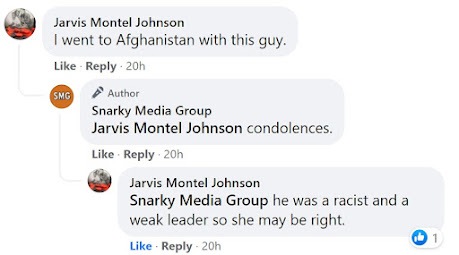Neo-Nazi rally in Arkansas was newsworthy
Neo-Nazi rally in Arkansas was newsworthy
By Steve Barnes
By Steve Barnes
It wasn’t a total news blackout, but close. The statewide daily newspaper had a reporter and photographer on site but published no story, no picture. One of the four Little Rock television stations carried a brief report, while the other three remained silent. Understaffed, public radio passed. The left-leaning Arkansas Times blog made cursory, condemnatory mention of it.
 |
At the Arkansas Democrat-Gazette, managing editor David Bailey: “Our usual practice is we don’t write up events that are obviously for publicity.” In other words, events that are, well, fake news.
I disagree, if somewhat uncomfortably, with the decision by those editors who ignored the bizarre assembly. In fact it was a publicity stunt and real news.
No matter that fewer than two dozen representatives constituted the NSM brigade, or that they were outnumbered 15-to-one by opponents, many of them strident in their opposition. There were no undecideds in the crowd, no merely curious. So, yes, a demonstration for its own sake.
But there was also this: a no-vehicles-allowed perimeter established around the Capitol, with one major intersection sealed by two huge city trucks; more than 200 city, county, state and federal law enforcement officers standing watch, including snipers atop a neighboring building; armored personnel carriers at each corner of the Capitol’s east front, and barricades the length of its lawn; a police mobile skybox at the building’s lower steps; a bomb-sniffing dog on the ground; a police helicopter circling overhead.
The inconvenience to motorists and the expense to taxpayers alone made the story impossible to ignore, even if editorial standards and simple decency suggested only the briefest mention of the anti-Semitic, white nationalist bile spewed by the kooks whose First Amendment rights public dollars properly protected. Free speech, always essential to America, is not always free.
Too, there’s the certainty that had violence occurred all local media would have responded immediately. (The obvious concern, among authorities and journalists, was another Charlottesville. As it happened, four belligerent National Socialist sympathizers among the counter-demonstrators were surrounded by police and escorted from the immediate area, but not arrested.)
Me? I was assigned by an out-of-state news organization to monitor the proceedings, and to not file a story in the absence of conflict, rather in line with the Arkansas Democrat-Gazette’s standard.
No violence having presented, I would have focused, as now, on the people on the other side of the police line, the men and women, young and old, black and white and Asian and Latino, Protestant and Catholic and Jew, who came to the Capitol representing other values.
For instance, Janna, a 34 year-old who, fearful of retribution, asked that her last name not be printed. “I’m not going to let Nazis come to my state and not show up to tell them they’re not welcome,” she said. “To be silent is to take a side.” The wrong one, she made clear.
And here was Walter Riddick, 62, attorney and veteran of almost three decades in uniform, whose forebears include a governor of Arkansas (Henry Rector) who supported “states’ rights” in 1860, and an assistant U.S. Attorney (his namesake father) who, a century later, represented federal supremacy during the Central High desegregation crisis.
Neuropathy has Walter Riddick in a wheelchair these days but he came anyway, blanketed against the cold, because “these people” — pointing to the Black Shirts — “represent a significant part of what I spent a lifetime working against.”
Riddick’s “chauffeur” was Alan Malcolm, 64, who brought not only his friend but a sepia portrait of his father, in his World War II Army uniform. “He fought those b-------,” Malcolm said. Thus he came “on my father’s behalf and my own.”
On behalf of her grandchildren came the decidedly feisty Robin Wilson, 65, who said she grew up with a segregationist father in a house in the shadow of Central High, National Guardsmen patrolling her street in the toxic days of 1957.
“These people have no clue or they wouldn’t preach the rhetoric of hatred they do,” she said of the NSM. Her children’s children were being raised to love people, she added, no matter who those people loved, how they worshiped, from where they came or the color of their skin.
You just read the story I would have written.



Comments
Post a Comment
You are welcome to email your tips, corrections and/or comments to: aidcommission@gmail.com please indicate if you wish to remain anonymous or otherwise. We will post your comment without edit.